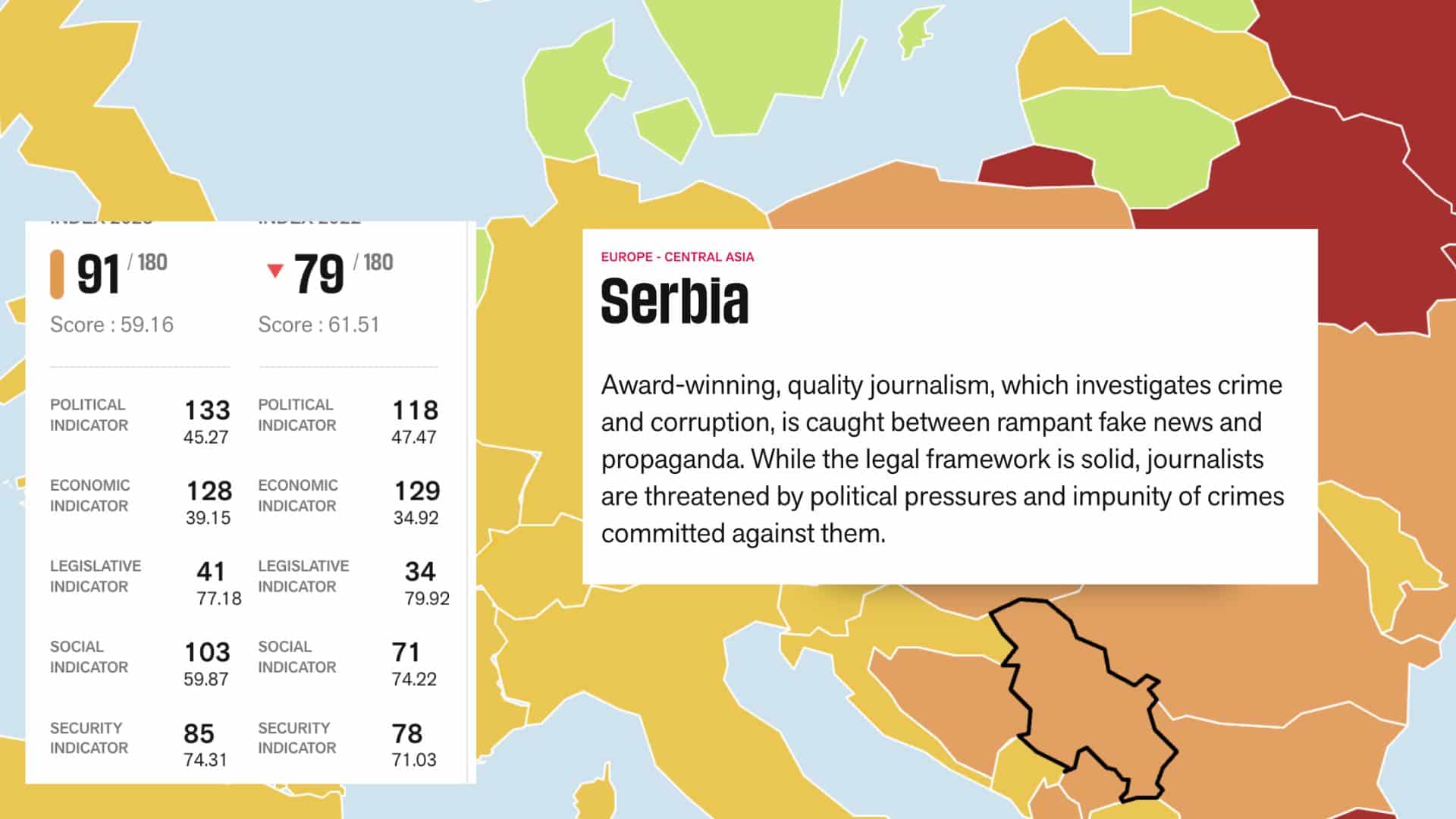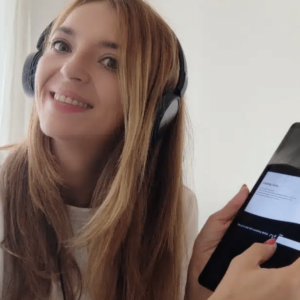When a journalist traveled from the east to the west of Europe, the level of press freedom was a cultural shock.

A map of countries on the site of Reporters Without Borders shows that Serbia slid to 91st place this year in the Press Freedom Index of countries.
In the heart of Southeast Europe lies a region that has witnessed the ebb and flow of history, where diverse cultures intersect and where the echoes of political turbulence linger—the Balkans.
It is a region that takes its name from the Balkan Mountains and comprises 10 countries: Albania, Bosnia and Herzegovina, Bulgaria, Croatia, Kosovo, Moldova, Montenegro, North Macedonia, Serbia and Slovenia.
I’m a journalist, born in Sarajevo in the now-dissolved Yugoslavia.
Twenty years ago, as a fresh-faced graduate, I embarked on a media tour in the Balkans. My initial steps were guided by the wise words of my journalism history professor, who emphasized the foundational role of radio in crafting a journalist’s skill set.
This piece of advice would shape the trajectory of my career. From the buzzing airwaves of radio, I transitioned to the dynamic world of television news, donning the hats of both reporter and public relations practitioner.
Press freedom in practice
Working in a Balkan newsroom is no ordinary journalistic role. It is a crash course in the multifaceted nature of the media landscape.
The first chapter unfolded when I relocated to Paris, where my preconceptions about journalism underwent a profound metamorphosis. The contrast was stark — journalists in Western Europe had access to abundant resources, supportive newsrooms and the freedom to pursue the stories that resonated with their journalistic ethos. It was a cultural shock, a realization that journalism could thrive in an environment where press freedom was not just a concept but a living, breathing reality.
The media landscape in the Balkans, however, paints a different picture. According to the World Media Freedom Index for 2023 that is compiled by Reporters Without Borders, among the Western Balkan countries only Serbia — with more than 2,500 media outlets registered in the country — saw its standing on the Index drop. It now stands at number 91 out of 180 countries.
Other Balkan countries were labeled under the category of “satisfactory” press freedom in 2023, but that left me both intrigued and somewhat skeptical.
Having walked the corridors of Balkan newsrooms, I find it hard to align with such a rosy classification.
This article was produced exclusively for News Decoder’s global news service. It is through articles like this that News Decoder strives to provide context to complex global events and issues and teach global awareness through the lens of journalism. Learn how you can incorporate our resources and services into your classroom or educational program.
And consider supporting News Decoder in our mission to promote global awareness and media literacy in our annual giving campaign.
You can talk truth to power but does it answer back?
Allow me to rewind to a particular moment that epitomizes the uphill battle faced by journalists in the Balkans. It was during a presidential election in the Balkans, where I, as a reporter, faced a common challenge.
I wanted to know what a candidate planned to do for education reform if he won. To my surprise, he brushed off the question, saying he didn’t have time for “those things.”
This incident reflects a broader issue journalists in the Balkans deal with. It’s not just about getting information; it’s about holding politicians accountable to their promises. This encounter showed how some crucial topics get ignored in the fast-paced world of politics.
In the bigger picture, it represents the challenges journalists face in the Balkans. Beyond the struggle for information, there’s a sense that politicians are sometimes disconnected from the issues that really matter to the people they represent.
As we talk about press freedom in the Balkans, this story highlights the need for a media environment where politicians are not only accessible but also willing to discuss important matters. The challenges in the newsroom go beyond just finding information; journalists dig into the heart of the region’s political scene, where uncovering the truth often faces significant obstacles.
The tension between media and politics
In Bosnia and Herzegovina, I share common ground with others who have navigated the multifaceted challenges, including economic pressures, political interference and a lack of public understanding of the vital role of journalism.
The erosion of institutions, with government services often ignoring or withholding information from journalists, further compounds the difficulties. There’s an urgent need for public support and understanding, essential components often lacking in a society where journalists struggle to assert a role in shaping a transparent and accountable governance structure.
Progress has been made, but an undercurrent of danger and hostility still defines the media landscape in many parts of the Western Balkans.
One cannot dissect the state of press freedom in the Balkans without acknowledging the omnipresent forces of political and economic pressure. It’s a delicate dance where journalists strive to maintain their professional integrity amidst the looming shadows of political influence. While Western counterparts may experience a healthy tension between media and politics, in the Balkans, the scales often tip in favor of political dominance.
Press freedom is more than a legal framework; it’s a delicate ecosystem that requires protection from both overt and subtle threats. Even with seemingly robust legal safeguards, journalists in the Balkans find themselves grappling with political pressures, compromising the very essence of an independent press. The contrast between what is envisioned in theory and what actually happens in practice is evident, posing a challenge for journalists as they navigate intricate situations.
An informed citizenry relies on information.
Economic challenges further compound the struggle for press freedom. The media landscape is fragmented, with limited resources allocated to quality journalism. The survival of news outlets often hinges on their ability to generate revenue. That results in pushing stories towards sensationalism and entertainment to capture audience attention. It’s a dilemma where the pursuit of truth clashes with the demands of a market-driven media economy.
It is noteworthy though that the people of the Balkans believe in the role of the press. In 2023, the Friedrich-Ebert-Stiftung in Bosnia and Herzegovina conducted a survey on the level of media freedom and trust in the media among the citizens of Bosnia and Herzegovina.
They found that citizens trust the media more than they do religious groups, government institutions and the international community and that most people believe that politicians violate journalistic rights.
As the political landscape in the Balkans continues to shape the narrative, journalists walk a tightrope between reporting the facts and navigating the intricate web of political sensitivities.
The advent of digital platforms offers a glimmer of hope, yet challenges persist. Around 200 podcasts have emerged in the Balkans, attempting to carve a space in a landscape still dominated by traditional media. The struggle to monetize content and the scarcity of advanced recording technology remain barriers, hindering the potential growth of this burgeoning form of media.
These days, I’m directing News Decoder’s part in a project called WePod that brings together nine organizations from seven European countries to study and hopefully nurture the podcasting industry in Europe, create collaborative audio content and train and connect podcasting professionals.
In some ways it brings me back to where I began. From exploring the buzzing airwaves of radio I am now doing so with its digital counterpart. But what hasn’t changed is the need for people to support journalism by purchasing content that offers quality, verified information and sharing content from trusted sources. They are the are essential steps that every informed citizen can take to bolster independent media. Because without this type of media, we won’t have informed citizens.
This narrative is just a glimpse into the complex landscape of press freedom in the Balkans. Andrea Knezevic will delve deeper into these issues in an upcoming episode of the Sounds Like Europe podcast, produced as part of the WePod project. Join Knezevic as she navigates the challenges and celebrates the resilience of independent media and explores the path forward for a more transparent, accountable and free press in the Balkans.
Questions to consider:
- What was different about how the press operated in Paris that surprised the author?
- What is one thing that makes reporting in the Balkans challenging for journalists?
- In your country do you think people trust the press more than they do the government? Why is that?

Andrea Knezevic is multimedia communications specialist for News Decoder. A seasoned communications specialist, journalist and university professor with more than a decade of experience honing the art of storytelling and effective communication, she splits her time between Paris and Brussels.
Read more News Decoder articles about journalism:
